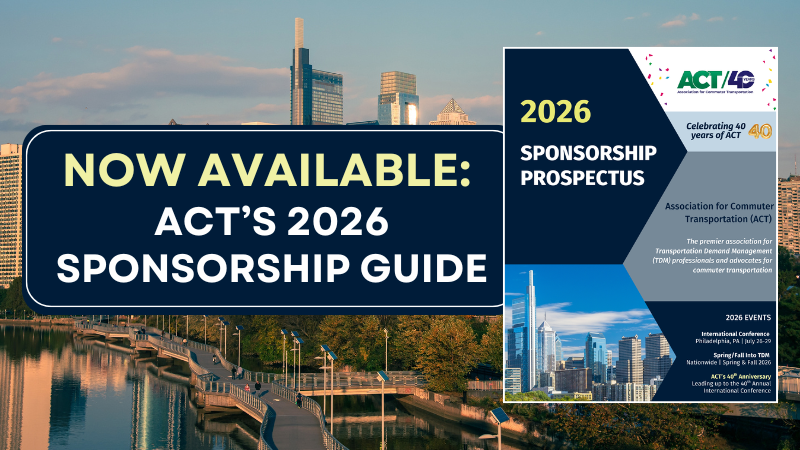The House and the Senate Transportation, Housing and Urban Development (THUD) Appropriations subcommittees are charged with providing annual appropriations for the Department of Transportation (DOT), the Department of Housing and Urban Development (HUD), and certain related agencies.
As part of our on-going public policy efforts, ACT is making a strong push to include language within the appropriations reports supportive of TDM.
Now, we need ACT members to help generate support for this language amongst their Congressional delegations before March 17 . We included an email template that you can use to ask your member of Congress to support and prioritize the inclusion of this provision in the final bill below. Customize it and send it to your member of Congress.
Outreach to House THUD members and Senate THUD members is most important. Click on their links to view member rosters.
If you have any questions or need assistance, please reach out to ACT's Government Affairs team via Ben Odendahl at beno@sda-inc.com.
Template Email to Your Members of Congress
Dear Senator/ Representative XXXXXXXX,
On behalf of [insert name of your company/ organization] in [City, State] I am writing to ask you to prioritize including the following language within the Transportation, Housing and Urban Development Appropriations Report:
Transportation Demand Management (TDM) – Notice of Funding Opportunity (NOFO) and Formula Funding Inclusion:
Transportation Demand Management (TDM) provides commuters with a range of options to access the United States transportation network through the use of technology and availability of other modes of transportation. TDM increases equity in our communities by providing more affordable transportation options and improved access to jobs. Examples of enacted policy that are based on the principles of TDM include qualified transportation fringe benefits, congestion pricing, vanpooling, ridesharing, high-occupancy vehicle lanes, parking management, and teleworking, among others.
The 2021 Infrastructure Investment and Jobs Act (IIJA) includes a record number of new formula and discretionary programs that have a nexus with transportation demand management strategies. It is important that eligible entities like state departments of transportation (DOT), transit systems, metropolitan planning organizations (MPOs), regional planning councils, counties, cities, special districts, and other transportation stakeholders understand that IIJA resources can fund TDM strategies.
-----------------------------
FY2024 Transportation-Housing & Urban Development (T-HUD) Report Language --
Transportation Demand Management.—The Committee recognizes the overwhelming need for strategies to reduce congestion in the United States’ transportation network. The Committee directs the U.S. Department of Transportation to include transportation demand management as an eligible use in in formula programs and Notice of Funding Opportunities (NOFO) under Public Law No: 117-58. The term 'transportation demand management’ means the use of strategies to inform and encourage travelers to maximize the efficiency of a transportation system, leading to improved mobility, reduced congestion, equity and lower vehicle emissions, including strategies that use planning, programs, policies, marketing, communications, incentives, pricing, data, and technology.
Again, we ask that you make the inclusion of this provision in the THUD appropriations report a priority for you and your office. If you have any questions, please follow-up with me or the Association for Commuter Transportation’s (ACT) Executive Director, David Straus (dstraus@actweb.org). Thank you.

